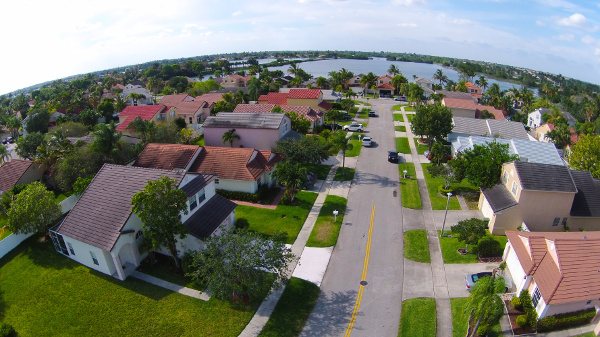 From finding the right agent to discovering the home you can truly feel comfortable in, there are a variety of things involved in the home buying process. However, it’s important not to get caught up in the home and ignore altogether the community you’ll be living in. If you’re planning a move to a new neighborhood, here are some things you should look into before putting in an offer.
From finding the right agent to discovering the home you can truly feel comfortable in, there are a variety of things involved in the home buying process. However, it’s important not to get caught up in the home and ignore altogether the community you’ll be living in. If you’re planning a move to a new neighborhood, here are some things you should look into before putting in an offer.
Local Amenities
A peaceful, picturesque community is ideal, but if there are not a lot of resources nearby for your family, it’s possible that your new neighborhood may not be the best fit. Instead of having to get in the car and drive everywhere, ensure you research nearby community centers, green spaces and recreational spots so your family has somewhere to spend their weekends.
Research The Crime Rate
You can certainly get a good sense of the well being of a community just by looking at it, but be sure that you’re informed about exactly how safe the surrounding area is so your family will feel at ease in their new locale. While you can easily research the community and find information online, websites like Neighborhood Scout and Crime Report also make it simple to discover the less well-known details.
Transportation And Accessibility
A community you love is ideal, but if you work in the downtown core or an area far away, it will be important to determine the effect this will have on the length of your commute. In addition, you’ll want to be sure there are local transportation options like buses and shuttles that provide access all over the center in the event that it’s needed.
Learn About The Locals
There’s something to be said for the perfect home, but you’ll also need to feel a certain sense of comfort in the place you live so ensure you choose a place with nice neighbors and a community feel. This may seem hard to determine before buying a house, but try visiting the local community center or knocking on a few doors for a quick impression of what the locals are like.
It can be easy to throw everything else out the window as soon as you’ve found the perfect home, but it’s important that your home is situated in a neighborhood you’ll feel comfortable in. Contact your local real estate professional for more information.
 One of the factors involved in feeling truly comfortable in your community is the relationships that you’ve been able to establish with the locals in your neighborhood, but it can be hard to know how to nurture a good relationship. Whether you’re moving to a new home soon or are wondering how to make some nearby friends, here are some simple tips for ingratiating the ones that live closest to you.
One of the factors involved in feeling truly comfortable in your community is the relationships that you’ve been able to establish with the locals in your neighborhood, but it can be hard to know how to nurture a good relationship. Whether you’re moving to a new home soon or are wondering how to make some nearby friends, here are some simple tips for ingratiating the ones that live closest to you. With all of the rigmarole that goes into packing up your old home and moving into the new one, there are a lot of details that can get lost in the mix. From cleaning up the old house to handing over the keys, there’s no shortage of small tasks that need to be completed. If you’ll soon be prepping for the exciting move into your next home, here are some ways to prepare yourself for this busy time.
With all of the rigmarole that goes into packing up your old home and moving into the new one, there are a lot of details that can get lost in the mix. From cleaning up the old house to handing over the keys, there’s no shortage of small tasks that need to be completed. If you’ll soon be prepping for the exciting move into your next home, here are some ways to prepare yourself for this busy time. It is common for home buyers to take steps to keep their out-of-pocket expenses to a minimum, and many will try to avoid paying for optional services for this reason. While you may not want to pay for all optional services, there are some that can be truly beneficial to you even if they are not required. After learning more about the services provided to you by a real estate attorney, you may be ready to seek out these professional legal services for your upcoming purchase.
It is common for home buyers to take steps to keep their out-of-pocket expenses to a minimum, and many will try to avoid paying for optional services for this reason. While you may not want to pay for all optional services, there are some that can be truly beneficial to you even if they are not required. After learning more about the services provided to you by a real estate attorney, you may be ready to seek out these professional legal services for your upcoming purchase. When you’ve found the perfect home and you’re preparing for all of the final details to be sorted, there are a few important things that should not be forgotten about. As a home inspection is among the last steps in the transfer of the home, here’s why it’s very important to find the right person for the job.
When you’ve found the perfect home and you’re preparing for all of the final details to be sorted, there are a few important things that should not be forgotten about. As a home inspection is among the last steps in the transfer of the home, here’s why it’s very important to find the right person for the job. The rush of excitement that comes with finding the home you’ve been looking for is ideal, but just because it seems like the perfect place, it doesn’t mean there aren’t other factors to consider. Instead of getting hit with buyer’s remorse, here are some tips so that your home purchase doesn’t become something you’ll regret.
The rush of excitement that comes with finding the home you’ve been looking for is ideal, but just because it seems like the perfect place, it doesn’t mean there aren’t other factors to consider. Instead of getting hit with buyer’s remorse, here are some tips so that your home purchase doesn’t become something you’ll regret. Beyond the mortgage, maintenance and property taxes of a new home, you may not be aware that many newer communities require you to be part of the Homeowner Association (HOA). If you’re wondering about what the HOA entails and how this can impact the home and community you live in, here are some facts that may be important to know before you buy.
Beyond the mortgage, maintenance and property taxes of a new home, you may not be aware that many newer communities require you to be part of the Homeowner Association (HOA). If you’re wondering about what the HOA entails and how this can impact the home and community you live in, here are some facts that may be important to know before you buy. There are plenty of things to consider when purchasing a home, from the size of place that you’re looking for to the amount of home you’re able to afford. While it’s certainly worth knowing what you want going in, here are a few factors that investors often think about when it comes to making or breaking the appeal of a real estate purchase.
There are plenty of things to consider when purchasing a home, from the size of place that you’re looking for to the amount of home you’re able to afford. While it’s certainly worth knowing what you want going in, here are a few factors that investors often think about when it comes to making or breaking the appeal of a real estate purchase. With all the work that goes into finding the kind of home you’ll want to put an offer on, it can be easy to forget about all the little things that happen after the deal has been made. While the paperwork involved in purchasing may seem like a long way off, here’s a quick review of some of the documents you’ll need when the time comes to seal the deal.
With all the work that goes into finding the kind of home you’ll want to put an offer on, it can be easy to forget about all the little things that happen after the deal has been made. While the paperwork involved in purchasing may seem like a long way off, here’s a quick review of some of the documents you’ll need when the time comes to seal the deal. If you’re planning to get a mortgage, it’s critical that you know your rights under the law. The Truth in Lending Act (TILA) is a piece of federal legislation that governs how mortgage lenders can and cannot operate their businesses.
If you’re planning to get a mortgage, it’s critical that you know your rights under the law. The Truth in Lending Act (TILA) is a piece of federal legislation that governs how mortgage lenders can and cannot operate their businesses.